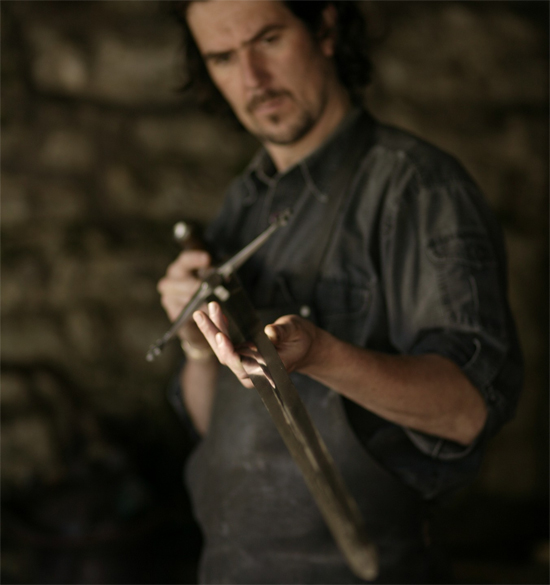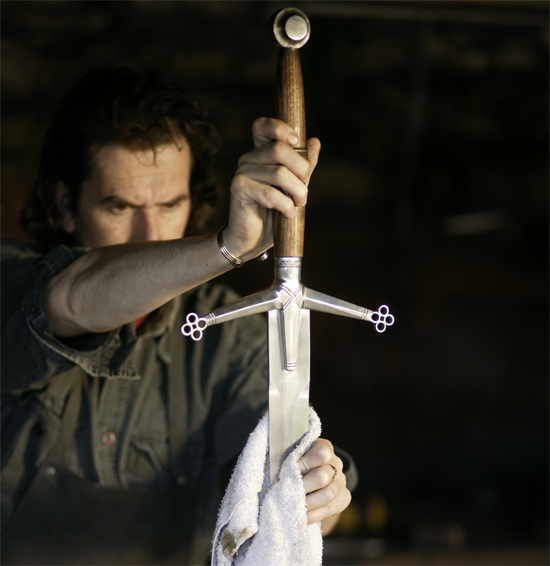Amebix was finished in 1987, and I came to Skye in 1991; so I’d say that I’d put the music behind me even before I turned up here and started making swords.
It was a door that I’d closed firmly. It was a literal move, but it was also psychological as well; I didn’t engage with anything from the musical part of my life until very recently with the reemergence of the band and the new album [Sonic Mass]. There were some things attached to that life that I wasn’t comfortable with, and I found those final days of the band to be a very difficult and dark time. In my mind, my life had failed.
I was never used to the idea of giving up, so instead I felt that I wanted to look for something else which was a reflection of the same sort of ideas I’d had in music. That’s what, about 20 years ago, really led me to do this kind of work. Being a swordsmith is such a primal, unnecessary thing to be doing in the 21st century, but at the time I felt that it was so imbued with the mythological power I’d been trying to manifest through the band.
I believe that the way people have communicated throughout history has often been in riddles.
If you could solve the riddle, you would understand the real metaphor they were alluding to. The King Arthur myth was one that always inspired me because it was so full and so psychologically complete as a cycle. It doesn’t have a historical precedent; we don’t know that there actually was a King Arthur, so it was kind of like a wish fulfillment for a race of people and their dream to be united under one powerful idea. It’s very spiritual in nature.
In the narrative, we’re told that the man who can draw the steel from the stone will be king. So I got to thinking about that, and I wondered, you know, what are they trying to say there? We’re very used to the film adaptation of a young boy standing atop a stone and kind of tugging away at this sword sticking out the top of it. But the description conjures up something very different for me.
I’m thinking that what hat they’re saying is that anybody who could draw iron from the rock would be the chief of the clan, the ultimate ruler. At that time, in the Iron Age, iron was actually the greatest currency, and weapons were like the Ferraris of the day. Having a great sword was both really important and really useful at that time. So the person who understood how to perform this really magical trick – which was to draw a rock into steel, to basically to turn that stone into a sword – would be the master. The smith, in that way, would become a leader, or at least gain this immense cultural power.
Soon after I first came here, I’d been talking to this guy I met at work about swords; and I thought, well, who makes swords these days?
I’d been pretty much on my arse and without any real idea of what I was going to be doing. I thought, first of all, that I’d need to find some kind of work just to keep my going, so I was working at a hotel in the evenings. That’s where bumped into this guy who had some very abstract ideas about mythology, which he shared with me, and those got me interested in some of the more obscure lines of inquiry that I feel like I’d been primed for all of my life. And that’s when the idea of actually becoming a swordsmith came up.
Of course, it was before the Internet, so I started writing to antiquarian bookshops all over the UK to see if they had any books about forging and things like that. It’s difficult for people now to imagine how hard it was to come by information before the Internet existed. I was waiting for weeks, sometimes for months, for stuff to come back. Then it was basically just learning from scratch about what a sword is, how you make one, and whether anyone actually still made them anymore. And I found that pretty much no one did make them anymore.
Once I had the materials I needed to learn, it was just a question of application. I’ve always been fairly artistic, so the creative side of me came into play a lot. Making a sword really isn’t all that difficult, but making a sword that’s really right is much more challenging. You can make an ugly piece of shit, which is not going to have much in the way of quality, but my view is that a sword should be functional and also something that looks right, that handles right, and that has a very definite aesthetic to it. It can be a very beautiful item, as well as a practical one.
I made my first sword for a local guy here in Skye, and it was an absolute piece of shit.
If I looked at it now I’d be embarrassed by it, but I was quite pleased with it at the time, just because I’d actually done it. It was a recreation of one of the swords from the first Highlander movie.
At that time I was actually more focused on making knives, because I was really just trying to figure out how to forge, and how to heat treat, and how to patent weld the steel. So I was mostly making smaller blades, and I’d put up a sign on the side of the road to attract tourists, which just advertised for knives and daggers. I’d start to pick up trade off the road then from people who would just stop in, and I’d be selling bits and pieces like that. But from there, it began to take on its own momentum to become the business I have now.
Some guy asked me to make a sword from the Zelda series once, and I told him: ‘This is a stupid sword. It doesn’t work. It’s a fantasy sword.’
And he said he didn’t care. So I told him I could make it to scale, and that it would cost around £3,000. It was going to be an intense amount of work. He still said to go ahead and do it, and I’m scratching my head thinking, for fuck’s sake, why would somebody want to do that?
But I guess, for some people, the idea of the sword is more important than the practicality of it – whereas for me, the two must go hand in hand. I don’t take any pleasure in making something that doesn’t work, and it’s almost an embarrassment for me as a swordsmith, because everything that comes out of my shop should be a functional piece of steel. It should be something that you can put up on the wall and look at; but if you need it, you should be able to take it down and use it for whatever purpose. But I ended up making the Zelda sword for him, and that’s just the way it is sometimes.
My clientele is worldwide.
I’ve been at this for about 21 years, and I have a reputation for what I do now. I’d say it took me about 10-15 years just to establish that reputation. Now, I’m recognized as one of the better sword makers in the world – not one of the best – but somewhere in the high-middle ground. So my clients are generally collectors and people who are into family heirlooms.
It’s that idea of a sword, hand-forged on the Isle of Skye in Scotland, with the family crest and everything on it. That appeals to a lot of people in terms of the continuity of their genealogy and the personal nature of handing down a piece like that through the generations.

My father was always into militaria.
He was an antiques person first of all, and then he went into being a gunsmith. So as a kid I was learning my way around flintlocks and submachine guns and things like that. Instead of playing football, I was just playing with guns and bombs.
But his interest later in life became very tied into the genealogy of the family and where we came from. It appears that the family was originally a clan of mercenaries who came from Fife in Scotland and went across to fight for the King of Sweden against the King of Norway.
It was only over the last few years that I learned more about my family history, from a guy who found out he was actually related to us. He had done his own research, and found out the peculiar fact that people in our family, throughout the ages, have been involved either in the military, arms manufacturing, or something else related to the two. It was very, very strange because I had already become a swordsmith at that point and it felt as if I’d just had this predisposition to get into it. And then I thought: Oh fuck, I’m falling into a stereotype!
I’ve never been truly happy with anything that I’ve done as a swordsmith. And, in a sense, I’ve always felt the same way as a musician.
I like trying to find out where these two journeys meet, the sword making and the music. I think the aspect of creativity is one of them. The creative person, in order to carry on and keep drawing from that well, can never be complacent. You must never sit on your laurels and say that it’s done.
I look at Sonic Mass and, for me, it’s years and years ahead – and not just in time – of anything else Amebix has ever done before. The old albums definitely had their own good qualities, but I think they were very primitive in comparison. They didn’t really do justice to the ideas we had at the time, at least not in the way Sonic Mass does. It’s a completely cohesive work. It’s something that’s meant to be listened to from one end to the other, and it’s meant to really engage the listener.
And that really ties into my work as a swordsmith, because as I’m forging a sword and giving it the truly magical quality I want, I need to be engaged at all times, almost like in a meditation, and I need to be completely present throughout that process. You can’t just stuff it in the fire, drag it out and hit it a few times, because that’s not enough. You need to be in there with every single hammer blow, and you need to realize that your mind is there within that steel. The fire opens up the lattice of the steel at the molecular level, to point at which the steel becomes alive within the fire. So what you’re doing as a smith is bringing your will to bear through the hammer into that area of the steel. I place my hammer blows, and with each hammer blow, my thought goes there, there, there.
I sometimes find it frustrating that most people don’t know who the fucking hell Amebix are.
We got buried, in a historical sense, about 25 years ago, despite the large influence on the music we saw subsequently over the next two decades. That was part of the thing that always frustrated me, seeing the manifestation of things we were trying to do happen again 10-20 years later, and when it gets brought to light I’m sitting there thinking: “Well, Amebix did that some time ago!”
But I’m not bitter about that anymore. Now I’m very much in the position of being a self-righteous bastard. I can sit down and say, that, well, we proved something, by coming back out of fucking nowhere and putting down an album that we’re very, very happy with. And it seems like it’s been incredibly well received all over the place. So it’s vindication, and it’s also the result of diligence and patience, those qualities I’ve also needed as a swordmith to do great work. These things come to bear on all the work as a whole.
It’s also funny because now, there are some locals here who are actually just realizing they have a swordsmith tucked away on the island. So they’re going: “Fucking hell, there’s a guy down there who makes swords! And if it couldn’t get any weirder, he plays heavy metal, too! And if you go on Youtube, you can find that fuckin’ lunatic playing all over the world!”
‘Shield Wall’ from the new album has kind of an aura of swords about it.
It sounds like swords being bashed against shields, and this whole tribal thing building up. In a sense, the album is a very foreground over the setting of ‘Days’, which is a recollection of times past, to the very definite statement of ‘Shield Wall’, where there’s a preparation for the battle to come, and the various things we’re going to be encountering within that landscape.
That’s just one of the many ideas that have migrated across from my interest in history, and the ideas that form the alchemical process of the swordsmith. Those things have definitely leaked into the music, or perhaps they were always part of the music in the first place.
I told Roy [Mayorga, Amebix’s drummer since 2008] that, as part of his initiation, he was going to have to make his own sword.
I’d convinced him to come over from the states and re-record the early tracks with us, and that’s how we kind of started the band again. And then he got invited back to the smith’s hideout over on the island to learn how to make a blade. And for him, that was like: “Fuckin’ dude! Fantasy!” So he was really happy about doing it.
It became something really special for him, as it did for me. I guess communicating ideas on a larger, more mythical level is what I’ve always been about. It’s really great to be back in the driver’s seat of something that, artistically, I feel confident about. I can say that, yeah, I can still do it. It works.



